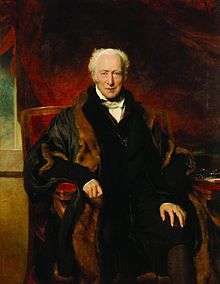Chamberlain of London

The Chamberlain of the City of London is an ancient office, dating back to at least 1237. Originally responsible for collection and distribution of revenues within the City of London. and nominally appointed by The Crown, the office-holder's term traditionally began on Midsummer Day and cannot be removed "unless some great cause of complaint appear against him".[1]
In 1590, the right of the Chamberlain to levy local taxes on goods sold within the city was upheld in The Chamberlain of London’s Case as a valid regulatory measure.[2]
Today the office still has important ceremonial responsibilities, including administering the creation of Freemen of London[3]
The chamberlain is the finance director of the City of London Corporation. He is the financial adviser, accountant, receiver and paymaster and is responsible for the City of London’s local and private / trust funds. He is also responsible for making arrangements for the investment of City of London and other funds and is one of the three official trustees. Through the Chamberlain's Court he also administers the admission to the Freedom of the City and personally admits all Honorary Freemen. He is also responsible to the Court of Aldermen for constituting new livery companies and interpreting and amending their ordinances and charters. The chamberlain’s relationship with the Court of Common Council is the same that applies to other local authority Chief Finance Officers (CFO) and he therefore has the same responsibilities placed on him as any other CFO in the UK. The current chamberlain is Dr. Peter Kane, the 80th chamberlain in continuous succession dating back to 1237.
Full list of Chamberlains
- John de Woburne and John Wacher (1237)
- Stephen de Mundene and Hugh Motun (1274-1277)
- Hugh Motun (1277-1285)
- William de Betoyne (1288-1298)
- John de Dunstaple and Simon de Paris (1298-1300)
- Nicholas Pycot (1300-1304)
- Richard Poterel (1304-1310)
- Luke de Haverynge (1310-1311)
- John le Mazeliner (1311-1313)
- John Dode (1313-1318)
- Thomas Prentiz (1318-1320)
- Andrew Horn (1320-1328)
- Henry de Seccheford (1328-1336)
- Thomas de Maryns (1336-1349)
- Thomas de Waldene (1349-1359)
- John de Cantebrigge (1359-1374)
- William de Eynesham (1374-1378)
- John Ussher (1378-1380)
- Richard Odyham (1380-1391)
- Stephen Speleman (1391-1404)
- John Proffyt (1404-1416)
- John Hille (1416-1420)
- John Bederenden (1420-1434)
- John Chichele (1434-1449)
- John Middleton (1449-1450)
- John Sturgeon (1450-1454)
- Thomas Thornton (1454-1463)
- Robert Colwyche (1463-1474)
- William Philip (1474-1479)
- Miles Adys (1479-1484)
- William Purchas (1484-1492)
- William Milbourne (1492-1506)
- Nicholas Mattok (1506-1517)
- John Barnard (1517-1525)
- John Husee (1525-1532)
- George Medley (1532-1548)
- Thomas Hayes (1548-1550)
- John Sturgeon (1550-1563)
- George Heton (1563-1577)
- John Mabbe (1577-1583)
- Robert Brandon (1583-1591)
- Thomas Wilford (1591-1603)
- Cornelius Fish (1603-1626)
- Robert Bateman (1626-1643)
- Gilbert Harrison (1643-1651)
- Thomas Player Snr (1651-1672)
- Thomas Player Jnr (1672-1683)
- Peter Ayleworth (1683-1684)
- Sir Peter Rich (1684–87; 1688–89; 1691)
- Henry Loades (1687-1688)
- Sir Leonard Robinson (1689-1691; 1691-1696)
- Sir Thomas Cuddon (1696-1702)
- Sir William Fazackerly (1703-1718)
- Sir George Ludlam (1718-1727)
- Samuel Robinson (1728-1734)
- Sir John Bosworth (1734-1751)
- Sir Thomas Harrison (1751-1765)
- Sir Stephen Theodore Janssen bart (1765-1776)
- Benjamin Hopkins (1776-1779)
- John Wilkes (1779-1797)
- Richard Clark (1798-1831)
- Sir James Shaw (1831-1843)
- Sir William Heygate bart (1843-1844)
- Anthony Brown (1844-1853)
- Sir John Key bart (1853-1858)
- Benjamin Scott (1858-1892)
- Sir William Cotton (1892-1902)
- Sir Joseph Dimsdale bart (1902-1912)
- Adrian Pollock (1912-1943)
- Anthony Pickford (acting 1943-1945)
- Irving Blanchard Gane (1945-1962)
- Ean Kendal Stewart-Smith (1962-1964)
- (Charles) Richard Whittington (1964-1973)
- John Percival Griggs (1974-1983)
- Bernard Harty (1983-1995; 1996-1999 with joint position of Town Clerk)
- Peter Derrick (2000-2006)
- Chris Bilsland (2006-2013)
- Dr. Peter Kane (2014-)
References
- ↑ "Book 2, Ch. 2 - Summary of civil government". British History Online. Retrieved 2009-12-12.
- ↑ "Online Library of Liberty - Cases of By-Laws and Ordinances The Chamberlain of London's Case. - Selected Writings of Sir Edward Coke, vol. I". oll.libertyfund.org. Retrieved 2009-12-12.
- ↑ "Chamberlain's Court ceremony". www.cityoflondon.gov.uk. Retrieved 2009-12-12.